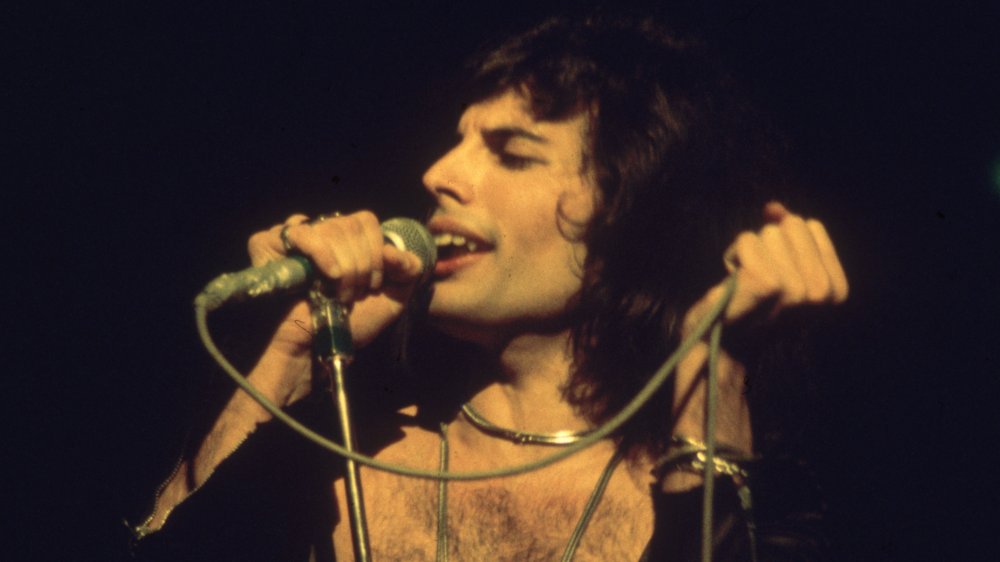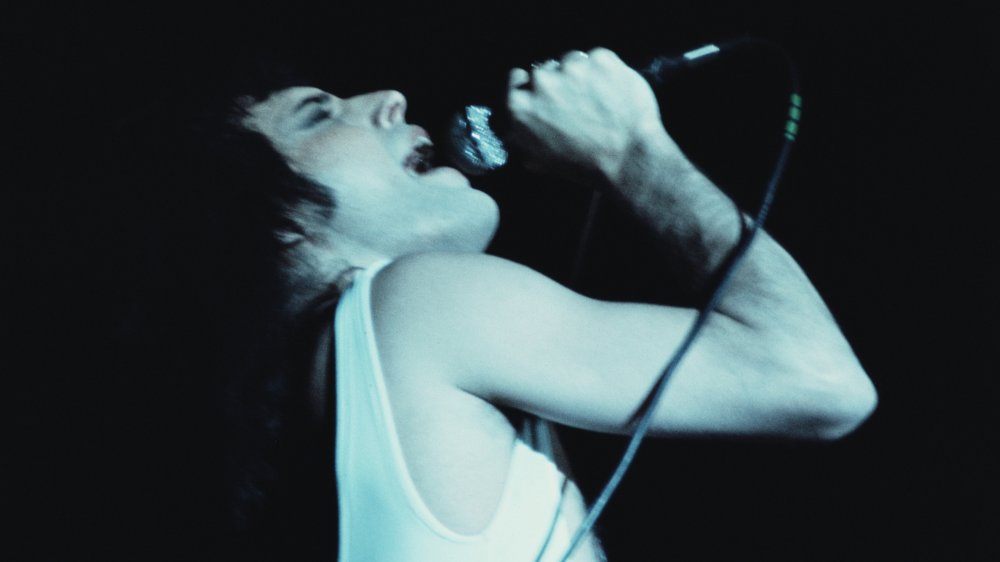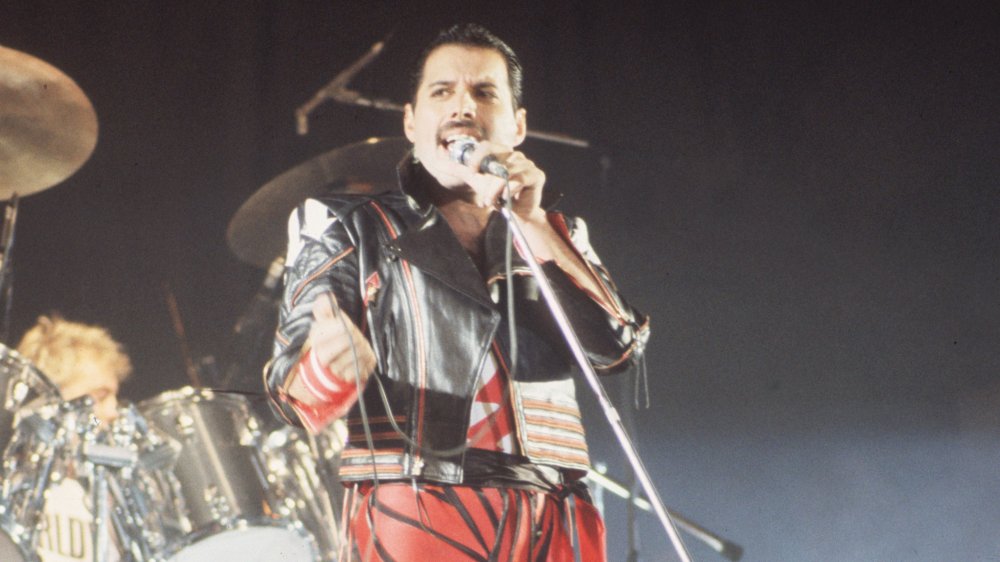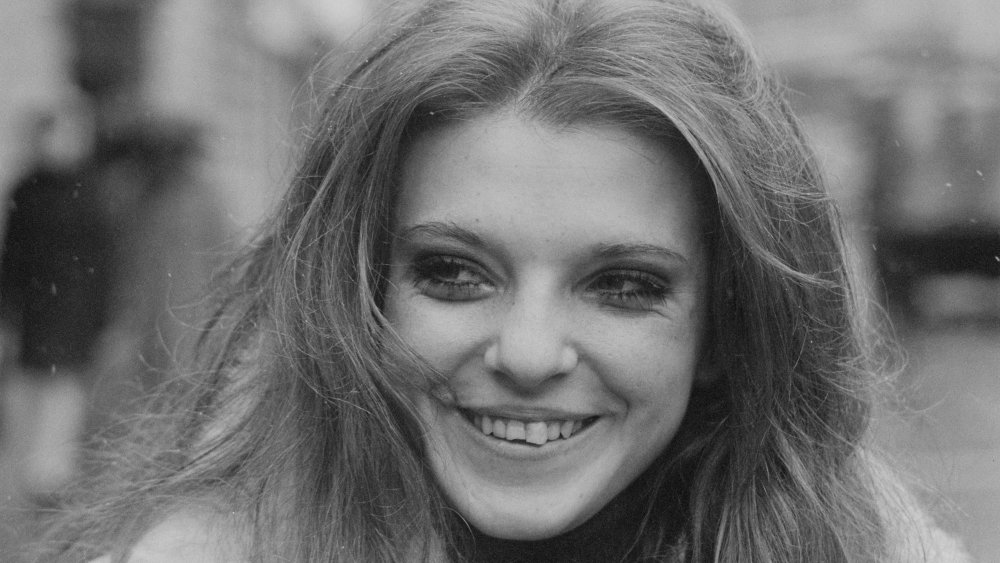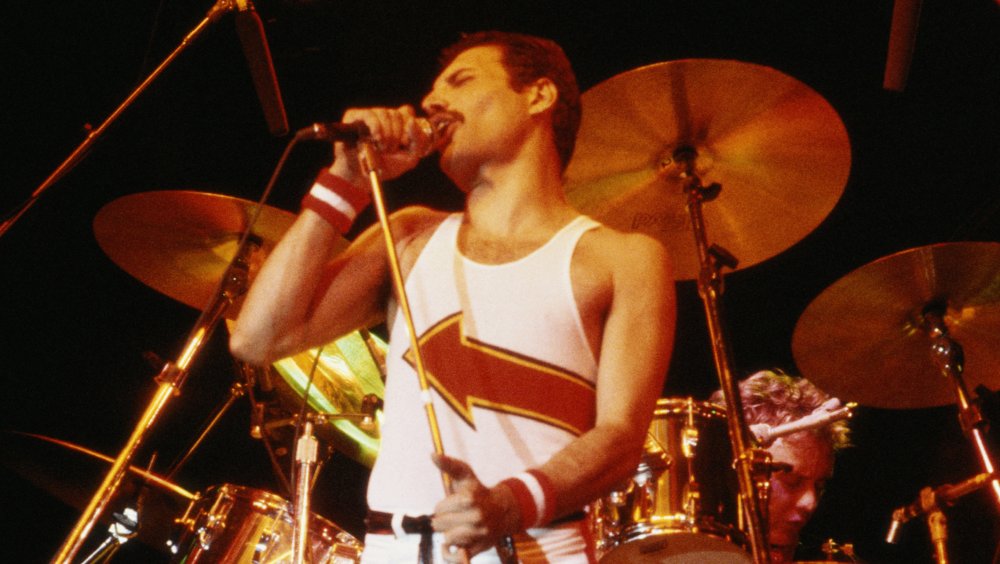This Is How Much Freddie Mercury Was Worth When He Died
"Bohemian Rhapsody" lied to you. Not the movie, which Queen guitarist and songwriter Brian May called a "fair cop" that portrays Freddie Mercury "very truthfully." Rather, the operatic masterpiece "Bohemian Rhapsody" told a series of five-alarm, pants-on-fire lies. Firstly, Mercury never killed a man; he slayed audiences like a killer Queen while strutting across the stage like a prince of the universe. Perhaps the biggest lie in that universe was the line, "I'm just a poor boy. Nobody loves me." For fat-bottomed girls, bicycle racers, and every one of us saved by Flash Gordon, Freddie Mercury was somebody to love. He also wasn't a poor boy from a poor family.
The man who would be Queen
Born Farrokh Bulsara in the Tanzanian archipelago of Zanzibar in 1946, Freddie Mercury came from a relatively well-to-do family, per the BBC. He lived in "a comfortable flat overlooking the sea" and had a nanny named Sabine. After school he and a friend would swim in the sea and bike along the beach. It's unclear whether he raced his bike, but signs point to yes. The young Mercury had a cosmopolitan upbringing. Like his parents, he adhered to the ancient Persian religion of Zoroastrianism. But he was educated by Anglican nuns at a Zanzibari missionary school until age 8, when his parents sent him to an Indian boarding school.
While in India, Mercury attended the St Peter's Church of England school. There he studied the piano and joined his first band, the Hectics, according to Biography. In 1963, he returned to Zanzibar but bloody upheaval ensued. In 1964, a massive uprising erupted, forcing him and his family to relocate to London. There, he would sing in several bands before meeting guitarist Brian May and drummer Roger Taylor. Bassist John Deacon would join in 1971. Mercury dubbed the band Queen, and they would spend the next two decades cementing their status as musical royalty.
The show goes silent
At the height of his fame, Freddie Mercury was like a rocket ship on his way to Mars, but he was on a collision course with mortality. History explains that in 1987, Mercury was diagnosed with AIDS but kept his condition under wraps. Instead, he resolved that the show must go on and continued to thrill audiences even as life's curtain call became increasingly imminent. By 1991, he was crumbling inside and out. Per NME, Brian May recalled that Mercury lost most of his foot. E! News writes that the singer grappled with blindness in the final months of his life.
One November 23, 1991, Mercury revealed that he was at death's door. The next day, he passed through it. Celebrity Net Worth estimates that the king of Queen was worth between $50 and $60 million. Meanwhile, Biography places the value of his estate at $75 million.
The love of Freddie Mercury's afterlife
The world's reaction to the loss of Freddie Mercury might be best captured in lyrics written by Mercury himself: "Bring it back, bring it back, don't take it away from me / Because you don't know what it means to me." That's of course the chorus to the painfully pretty ballad, "Love of My Life," which the Queen frontman famously wrote about his former fiancee and forever best friend, Mary Austin. Austin came into Mercury's life when he was just 24 and she was 19, per Biography. Over time their relationship hit a serious snag, and Austin suspected infidelity with another woman. After six years together Mercury came out to her as bisexual, to which Austin responded, "'No Freddie, I don't think you are bisexual. I think you are gay.'"
After their romance Mercury led his love life as as a gay man, but he and Austin had a love that transcended labels. The singer was quoted as saying, "All my lovers asked me why they couldn't replace Mary, but it's simply impossible. The only friend I've got is Mary, and I don't want anybody else. To me, she was my common-law wife. To me, it was a marriage." Austin stayed with him in health and in sickness, caring for Mercury until the bitterest of endings. After his passing, his will gave a glimpse of how much she meant to him.
The New Zealand Herald reports that the Queen frontman gave Austin a king's ransom, including Louis XV furniture, a 28-room mansion, and half of all his posthumous Queen earnings. His parents, by comparison, received 25 percent of Mercury's future earnings while his sister received the remaining 25 percent. Biography says that thanks to the huge commercial triumph of the Bohemian Rhapsody biopic, Austin netted an estimated $50 million in royalties.
Freddie Mercury's worth went beyond money
Back in the 1980s and early '90s the AIDs crisis was shrouded in a thick veil of homophobia. Throughout his own ordeal with the disease, Freddie Mercury would mostly suffer in silence, only sharing his secret with those closest to him because he didn't want to be "the poster boy for AIDs," according to Time. But just before succumbing to the illness, Mercury opened up about his AIDs diagnosis and voiced his "hope that everyone will join with me, my doctors and all those worldwide in the fight against this terrible disease." He died the following day.
In breaking his silence, he joined a litany of celebrities who would help chip away at the vicious stigma surrounding AIDs. Additionally, Queen members Brian May and Roger Taylor and band attorney Jim Beach helped form The Mercury Phoenix Trust (MPT). The organization has donated over $17 million and financed more than 1,000 projects geared toward combating HIV and AIDs. Those contributions go far beyond dollars and cents, helping to make a difference in the lives of people whose humanity was all too often denied before Mercury died.
